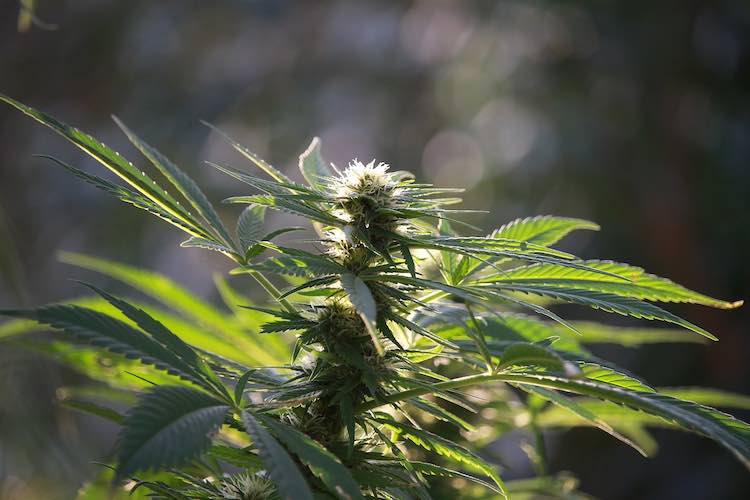Modified on: 15/04/2024
THE BENEFITS OF FULL SPECTRUM CBD OIL FOR SLEEP DISORDERS
CBD, or cannabidiol, is the second main metabolite contained in cannabis. Unlike THC, or tetrahydrocannabinol, it is not a psychoactive substance, which is why it is not subject to the same restrictions.
It is therefore available, usually in the form of CBD oil, even in countries where the recreational use of marijuana is considered illegal.
The beneficial effects of CBD weed are attested by numerous scientific publications. Here are the main ones:
- The Journal of Pharmacology documents the efficacy of CBD on people suffering from convulsions, particularly those with epilepsy who no longer respond to the treatments with traditional drugs: on a sample of 8 patients, it is claimed, 4 did not show convulsions and 3, instead, had a noticeable improvement in their clinical condition;
- The magazine Frontiers in Psychiatry has published a study according to which CBD appears to be an effective anxiolytic, capable of counteracting the side effects derived from taking an overdose of THC: in patients suffering from anxiety and paranoia following massive assumptions of THC, CBD positively counteracted the negative effects, significantly reducing the anxiogenic effects.
It has also been ascertained that CBD, present in CBD flowers, has anti-inflammatory, antioxidant, analgesic and antidepressant properties; Recent research has confirmed the positive action on endocannabinoids CB1 and CB2, important neuroprotectors.
Read also: Sport and Cannabis CBD in urine
The best alternative and free of contraindications due to combustion is the cannabis oil, available in capsules, in solution for oral intake, CBD oil for the vaporizer or for the application directly on the skin.
Among the multiple uses of this product, one of the most interesting is surely the one against insomnia: in fact it relaxes the muscles favoring a peaceful and quality sleep.


CBD for sleep: overview
CBD, or cannabidiol, has emerged as a promising remedy for addressing sleep-related issues and promoting better sleep quality. Numerous individuals struggling with sleep disorders or poor sleep have turned to CBD products, such as CBD oil, to find a natural sleep aid.
CBD is a compound derived from the cannabis plant, specifically the hemp plant, and is distinct from THC, the psychoactive component of the cannabis plants. CBD oils, particularly full-spectrum CBD oil, harness the benefits of the entire cannabis plant, including various cannabinoids and terpenes. This full-spectrum approach may contribute to the “entourage effect,” enhancing the potential therapeutic effects of CBD.
Research suggests that CBD affects the endocannabinoid system, a complex network of receptors that plays a crucial role in regulating bodily functions, including the sleep-wake cycle. CBD interacts with cannabinoid receptors in the nervous system, potentially leading to a decrease in anxiety, one of the factors that can interfere with falling asleep.
CBD use for sleep is not limited to oil formulations; CBD gummies and other CBD products have gained popularity as alternative forms of consumption. CBD’s anti-anxiety properties may contribute to improved sleep by helping individuals manage stress and anxious thoughts before bedtime.
Clinical data also indicates that CBD may be beneficial in managing pain, making it particularly relevant for individuals whose sleep problems are associated with chronic pain conditions. Moreover, early research suggests that CBD could be used to treat rare and severe forms of sleep-related disorders, such as REM sleep behavior disorder.
CBD use for sleep has raised interest from various quarters, including sleep coaches and healthcare professionals. However, it’s crucial to consider safety and side effects, especially when taking CBD alongside other medications. While CBD is generally well-tolerated, more research is needed to fully understand its potential drug interactions and its impact on various medical conditions.
The legality of CBD is another aspect that has garnered attention. Hemp-derived CBD products, containing less than 0.3% THC, are legal at the federal level in the United States. However, it’s essential to note that CBD is not a controlled substance, and further research is necessary to explore its full spectrum of effects.
For those interested in using CBD for their sleep disorders, determining the appropriate dosage is crucial. How much CBD is needed to improve sleep varies from person to person, and it’s advisable to start with a lower dose and adjust as needed. The FDA has approved a CBD-based medication for treating rare and severe forms of epilepsy, but more research is needed to establish definitive guidelines for other conditions, including sleep disorders.
In conclusion, while there is evidence suggesting that CBD may play a role in managing sleep-related issues and improving sleep quality, it’s essential to approach its use with caution. Consulting with healthcare professionals and staying informed about the latest research can help individuals make informed decisions about incorporating CBD into their sleep routine.
Does CBD reduce deep sleep?
As CBD (cannabidiol) gains popularity for its potential sleep-inducing properties, questions arise regarding its impact on specific sleep stages, particularly deep sleep. In this exploration, we delve into the relationship between CBD and deep sleep, shedding light on the existing research and considerations for those using CBD as a sleep aid.
Understanding CBD for Sleep:
CBD, a constituent of the cannabis sativa plant, has been the subject of numerous studies exploring its potential to improve sleep quality. Many users turn to CBD products, including CBD gummies and other formulations, seeking better sleep and relief from sleep-related issues.
CBD’s Mechanism of Action:
To comprehend the potential impact of CBD on deep sleep, it’s crucial to understand how CBD interacts with the body. CBD is thought to influence the endocannabinoid system, a complex network of receptors that regulate various physiological processes, including sleep. However, the specific mechanisms through which CBD affects sleep stages, such as deep sleep, remain a subject of ongoing research.
Mixed Findings on CBD and Sleep Stages:
Research on the impact of CBD on sleep is still in its early stages, and findings can vary. Some studies suggest that CBD may have a positive influence on overall sleep quality, helping individuals fall asleep faster and experience better sleep. However, the direct effects on specific sleep stages, including deep sleep, are less clear.
Considerations for CBD Users:
For individuals using CBD to address sleep-related issues or as a sleep aid, it’s essential to consider factors such as the type of CBD product and its composition. Broad-spectrum CBD, which contains multiple cannabinoids excluding THC, and CBD isolate, which contains only CBD, are among the choices available to consumers.
CBD and Medical Conditions:
While CBD shows promise in managing certain medical conditions, such as pain relief for individuals with chronic ailments, its impact on sleep can vary based on individual factors and the underlying medical condition. Research suggests that CBD may be beneficial for Parkinson’s disease patients, but more investigation is needed to determine its influence on deep sleep in this context.
As individuals explore CBD for sleep improvement, it’s crucial to approach the topic of deep sleep with cautious optimism. While CBD may contribute to better sleep and faster onset of sleep, its specific impact on deep sleep remains an area that requires further exploration. CBD users should be mindful of individual responses, consult with healthcare professionals, and stay informed about ongoing research developments in the dynamic field of CBD and sleep medicine.


CBD oil, ideal for insomnia, stress and difficulty falling asleep
Although there is no scientific documentation of the positive action of CBD in cases of insomnia patients, cannabidiol exerts, however, a positive action against all impediments to a restful and regenerative sleep.
As a THC antagonist, cannabidiol intervenes in the regulation of heart rate, breathing and body temperature.
States of over-excitement, dictated by both stress and the intake of stimulant substances, such as caffeine, can easily be counteracted with the intake of cannabis oil.
In fact, cannabidiol inhibits the exciting effects by restoring to the individual a regular heartbeat, a less frenetic breathing and a natural body temperature, in order to produce the effect of an overall relaxation of the body and the psyche. A peaceful sleep is impossible without this condition.
In addition, the anti-inflammatory properties of CBD weed make it an effective remedy for headaches or muscle inflammation. The CBD oil, in fact, taken either through the vaporizer or with sub-lingual drops, allows the most painful migraines to be right, giving the relief necessary to allow themselves the deserved hours of sleep without the contraindications derived from the use of anti-inflammatories traditional, which go to stress the gastrointestinal system.
The CBD oil, also in the form of ointment, can instead be applied directly on the affected part to help the muscles relax, relieving muscle pain due to cramps or lactic acid accumulation, allowing to cure one of the main causes of insomnia, or chronic pains.
The action of antioxidants has long been established as one of the best forms of prevention disease control of cardiovascular diseases, neurodegenerative diseases and the immune system.
Usually we always recommend the preventive consumption of fruits and vegetables, rich in natural antioxidants. CBD oil, like plant foods, is one of the best antioxidant supplements.
Their action is almost imperceptible in the short term but, with a constant consumption over time, gives exceptional results, allowing to avoid those imbalances that make the body susceptible to serious diseases as much as to slight seasonal ailments.
Everyone knows how hard it is to fall asleep when you have a runny nose or a sore throat: CBD oil can make people sleep effectively calm these symptoms.
Furthermore, the antidepressant and antipsychotic properties recognized in CBD are particularly useful in combating the other main causes of insomnia in addition to chronic pain: anxiety and paranoia.
Read also: What contraindications does CBD oil have?
Not being a psychoactive metabolite, cannabidiol does not involve the contraindications that characterize other substances, so the relaxing effects are not accompanied by upheavals of perceptions and psyche.
The intake of CBD oil, therefore, can very well allow you to serenely face certain problems underlying stress. It also acts positively on the psyche, guaranteeing the tranquility and serenity necessary to fully benefit from the restorative effect of the hours of sleep fundamental for the body and the mind.
What is the best CBD oil for relaxation and sleep?
In recent years, CBD (cannabidiol) has gained widespread popularity for its potential therapeutic benefits, especially in addressing sleep-related issues and promoting relaxation. As the demand for CBD products continues to rise, it’s crucial to navigate the market and find the best CBD oil for achieving a good night’s sleep and relaxation.
Understanding CBD and Its Effects:
CBD is a naturally occurring compound derived from the cannabis sativa plant, specifically the hemp plant. Unlike its counterpart THC (tetrahydrocannabinol), CBD is non-psychoactive, meaning it doesn’t induce a “high.” Instead, CBD interacts with the endocannabinoid system, a complex network of receptors that plays a vital role in regulating various bodily functions, including the sleep-wake cycle.
Full Spectrum CBD for Maximum Benefits:
When considering CBD for relaxation and sleep, opting for full-spectrum CBD oil is often recommended. Full spectrum includes a range of cannabinoids and terpenes from the cannabis plant, potentially enhancing the therapeutic effects through what is known as the “entourage effect.” Relevant animal studies suggest that the combination of these compounds may offer superior benefits compared to isolated CBD products.
CBD and Anxiety Reduction:
One of the key reasons individuals turn to CBD for relaxation is its ability to decrease anxiety. Anxiety disorders are often linked to trouble sleeping, and CBD has shown promise in alleviating stress and anxious thoughts, contributing to improved sleep quality.
CBD Products for Sleep:
CBD oil is available in various forms, and choosing the right product depends on individual preferences. CBD gummies have become a popular option, offering a tasty and convenient way to incorporate CBD into a nightly routine. Whether taking CBD oil or gummies, it’s essential to consider the safety and side effects, especially for those taking other medications.
Regulatory Considerations:
To ensure safety and quality, consumers should look for CBD products that are FDA approved. Additionally, checking the legal status is crucial, as hemp-derived CBD products containing less than 0.3% THC are legal at the federal level. Broad-spectrum CBD, which contains multiple cannabinoids excluding THC, is another option for those who want to avoid any trace of psychoactive effects.
CBD and Specific Sleep-Related Disorders:
For individuals dealing with specific sleep disorders like REM sleep behavior disorder or those with Parkinson’s disease, CBD may offer potential relief. While more research on sleep medicine is needed, early evidence suggests that CBD could play a role in managing these conditions, leading to more restful sleep.
As individuals seek the best CBD oil for relaxation and sleep, it’s essential to consider factors such as product type, full-spectrum content, and regulatory approvals. CBD offers a natural and promising avenue for those looking to improve sleep quality, and staying informed about ongoing research developments can guide consumers towards making informed choices. Always consult with healthcare professionals before incorporating CBD into your routine, especially if you have pre-existing medical conditions or are taking other medications.
You sleep better with CBD oil
Although, as it has been said, there are no specific studies on the intake of CBD oil on people suffering from insomnia or having difficulty falling asleep, its effects on the physical and on the psyche are such as not to raise doubts about its potential application as a remedy for restless nights poor sleep itself.









